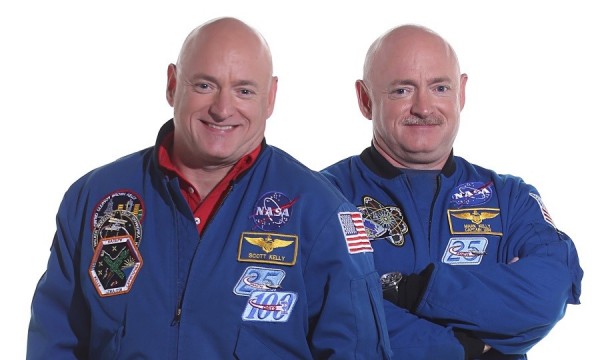By Ana Verayo, | February 02, 2017

Identical twins, Scott and Mark Kelly, are the subjects of NASA’s Twins Study. Scott (left) spent a year in space while Mark (right) stayed on Earth as a control subject. Researchers are looking at the effects of space travel on the human body.
Two astronauts who are also twin brothers participated in NASA's Year in Space Twins Study, and now, the results are here, revealing the initial effects of space on the human body.
NASA astronaut Scott Kelly left for Earth in March 2015 where he stayed for almost a year at the International Space Station. Meanwhile, his twin brother, retired astronaut Mark Kelly stayed here on Earth during this study.
Like Us on Facebook
Now, NASA's Human Research Program revealed the results, creating stark contrasts of their genes' activities and makeup. New data demonstrated how the Kelly twins now have significant differences in gene expression signatures.
Gene expression is how a gene is copied to carry out multiple cellular functions however, this rate of copying can be altered with environmental changes. Even the simplest change in diet or sleep patter can affect gene expression.
In this study, Scott showed a large difference in gene expression than normal, since he was living in space. For example, Scott has decreased DNA methylation than Mark where hydrogen and carbon in Scott's body was of a different kind than on Earth, like Mark's. This DNA methylation can affect aging, carcinogenesis and neural development.
Before Scot Kelly blasted off into space, his genomic data was taken by NASA scientists and when he returned after 340 days from lower Earth orbit. A future manned mission to Mars can take at least nine months, and a round trip about 500 days.
When Scott returned back to Earth, his DNA methylation went back to normal, when he was back here on Earth however, scientists are still investigating what this means to humans preflight and during spaceflight.
According to geneticist Andrew Feinberg from the Johns Hopkins University, the most crucial point of this study is that studying the genomics of astronauts in space is feasible. The partial results of the study is published in the journal, Nature.
-
Use of Coronavirus Pandemic Drones Raises Privacy Concerns: Drones Spread Fear, Local Officials Say

-
Coronavirus Hampers The Delivery Of Lockheed Martin F-35 Stealth Fighters For 2020

-
Instagram Speeds Up Plans to Add Account Memorialization Feature Due to COVID-19 Deaths

-
NASA: Perseverance Plans to Bring 'Mars Rock' to Earth in 2031

-
600 Dead And 3,000 In The Hospital as Iranians Believed Drinking High-Concentrations of Alcohol Can Cure The Coronavirus

-
600 Dead And 3,000 In The Hospital as Iranians Believed Drinking High-Concentrations of Alcohol Can Cure The Coronavirus

-
COVID-19: Doctors, Nurses Use Virtual Reality to Learn New Skills in Treating Coronavirus Patients







